While visiting with us at Quaffee Dan shared an update on the activities and achievements of Migoti Coffee, a company. At Present Migoti that operates two washing stations in Burundi and works with local coffee farmers to produce high-quality coffee.
Here is a summary of what he shared.
History and Growth of Migoti Coffee
The key events and milestones of Migoti Coffee since its establishment in 2016, include:
- Building the Migoti washing station in 2016 and the Kinama washing station in 2023.
- 2019 – Zephyrin joins team as Migoti Station Manager, small harvest, quality improves significantly
- Partnering with Zuka Green Coffee in South Africa and Omwani in UK/Europe for exporting and marketing.
- Improving the quality and traceability of the coffee through training, cupping, lot design, and QC lab.
- Expanding the number of coffee farmers from 310 in 2019 to 1236 in 2023 and distributing coffee seedlings to them.
- In the future, Migoti will look at diversifying the income sources by producing essential oils, livestock, and roasting coffee for the local market.
Five-year Growth
Migoti Coffee has seen steady growth in the number of farmers working with them over the last 5 years. The number of farmers has increased from 310 in 2019 to 1236 in 2023. This growth has come as existing farmers get to know and trust Migoti Coffee, as their geographical reach expands, and as new farmers plant trees and harvest coffee.
Over the past five years, Migoti Coffee has given coffee seedlings to local coffee farmers at the rate of about 30,000 trees per year. Many of the new coffee trees are now producing cherries, which helps to increase the quantity of harvest and also hopefully to reduce the dramatic biennial cyclicity of the coffee trees. Providing value-added services to the farmers, like microfinance loans based on their coffee harvest in the previous year, encourages them also to plant new coffee trees and improve their coffee farms.
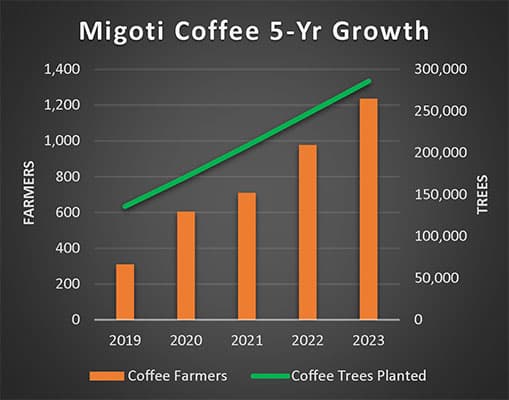
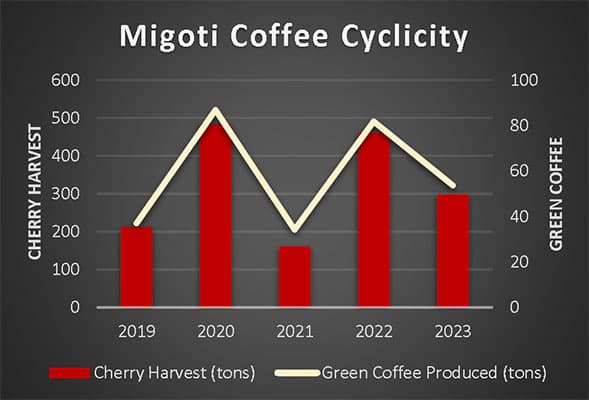
Biennial Cyclicity
Dan highlighted the phenomenon of biennial cyclicity. Which is the alternating pattern of high and low coffee harvests due to various factors such as tree age, rainfall, soil fertility, and microclimate. Migoti Coffee has experienced this cyclicity in its production and is attempting to reduce this cycle by planting new coffee trees, distributing shade trees, promoting mulching, and stabilizing topsoil.
Cherry and FOB Prices
Migoti Coffee has increased the cherry price paid to farmers from 650 BiF (Burundi Francs)/kg in 2019 to 1280 BiF/kg in 2023, which represents 44% of the FOB price. Furthermore, Migoti Coffee will continue to increase the real return to farmers by giving bonuses based on its profitability.
Migoti Coffee has been expanding its operations and services over the last 5 years. The cherry price paid to coffee farmers represents 44% of the total FOB price, with the other major costs being wet milling (11%), dry milling (5%), export/marketing (10%), Burundi overhead (16%) and investments (14%). Migoti Coffee has reinvested all profit into infrastructure and community projects such as public water supply, microfinance loans, trees for distribution to farmers, organic fertilizers, essential oils crops for farmers to diversify their income, training and QC, and overall work to improve coffee quality and traceability to increase the value of the coffee.
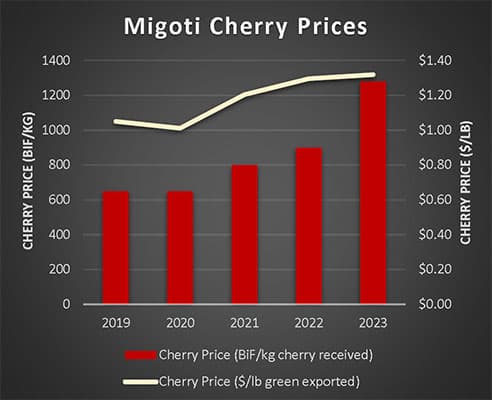
Quality and Traceability
Migoti Coffee has divided the farmers into different hill groups based on their geographical location, climate, and altitude. The figure below is a map of the six hill groups that deliver cherries to the Migoti and Kinama washing stations. These hill groups are treated as unique cooperatives and Migoti Coffee works with them to communicate, train, distribute inputs, collect cherries, provide microfinance loans, distribute payments and bonuses, and discuss successes and challenges.

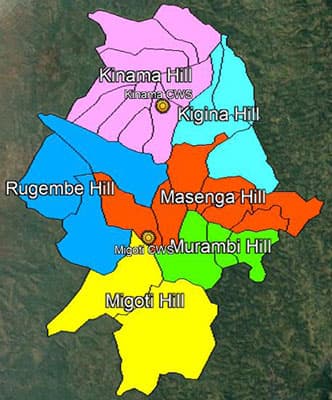
Climate Change
Migoti Coffee is preparing for the impact of climate change on the coffee-growing regions in Burundi and how to do it. Using established research, Migoti predicts longer dry seasons, less rainfall, extreme rainfall events, mudslides, landslides, and rising temperatures. Maps that show how the best coffee growing areas will shift to the highest mountains along and next to the continental divide. As Migoti Coffee’s stations are located in a good coffee-growing region that is expected to remain suitable for coffee farming with climate warming. The document also states that Migoti Coffee will adapt its farming practices and crop types to cope with the changing climate conditions.
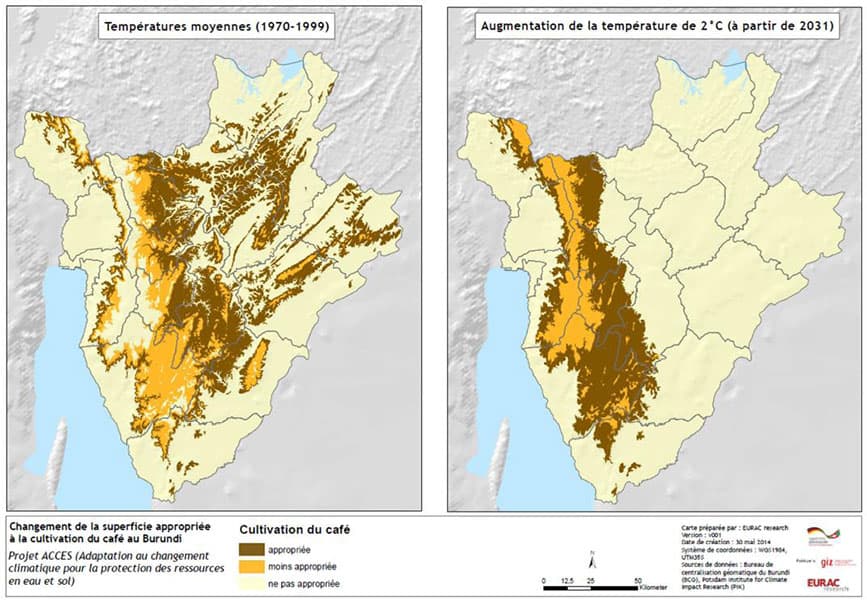
Source: Dan’s document, he provided us with summaries by Bing.


